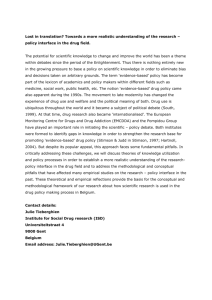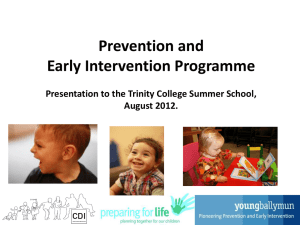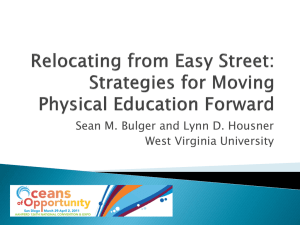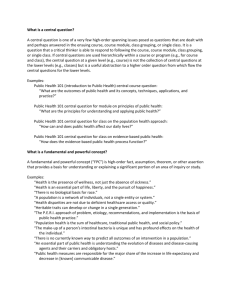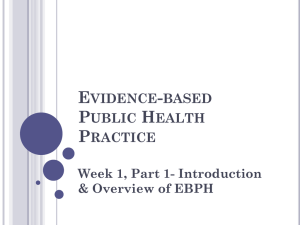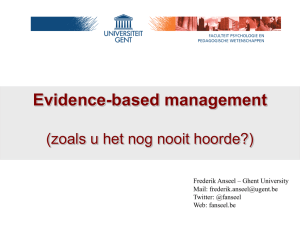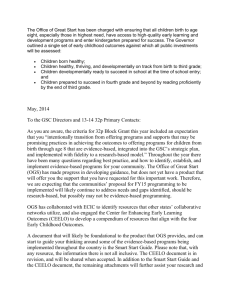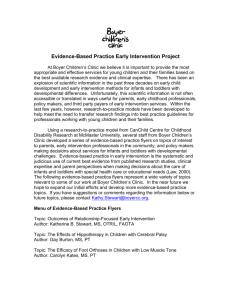Evidence-based Practice HOD Fact Sheet House of Delegates
advertisement
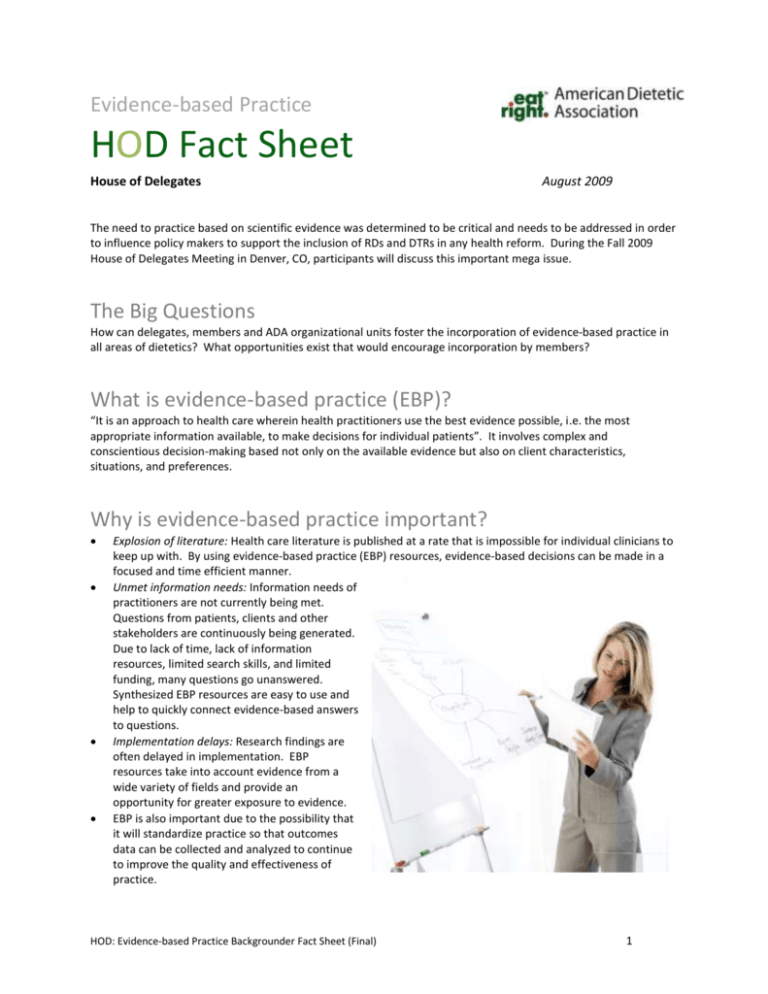
Evidence-based Practice HOD Fact Sheet House of Delegates August 2009 The need to practice based on scientific evidence was determined to be critical and needs to be addressed in order to influence policy makers to support the inclusion of RDs and DTRs in any health reform. During the Fall 2009 House of Delegates Meeting in Denver, CO, participants will discuss this important mega issue. The Big Questions How can delegates, members and ADA organizational units foster the incorporation of evidence-based practice in all areas of dietetics? What opportunities exist that would encourage incorporation by members? What is evidence-based practice (EBP)? “It is an approach to health care wherein health practitioners use the best evidence possible, i.e. the most appropriate information available, to make decisions for individual patients”. It involves complex and conscientious decision-making based not only on the available evidence but also on client characteristics, situations, and preferences. Why is evidence-based practice important? Explosion of literature: Health care literature is published at a rate that is impossible for individual clinicians to keep up with. By using evidence-based practice (EBP) resources, evidence-based decisions can be made in a focused and time efficient manner. Unmet information needs: Information needs of practitioners are not currently being met. Questions from patients, clients and other stakeholders are continuously being generated. Due to lack of time, lack of information resources, limited search skills, and limited funding, many questions go unanswered. Synthesized EBP resources are easy to use and help to quickly connect evidence-based answers to questions. Implementation delays: Research findings are often delayed in implementation. EBP resources take into account evidence from a wide variety of fields and provide an opportunity for greater exposure to evidence. EBP is also important due to the possibility that it will standardize practice so that outcomes data can be collected and analyzed to continue to improve the quality and effectiveness of practice. HOD: Evidence-based Practice Backgrounder Fact Sheet (Final) 1 Calling All ADA Members For dietitians to remain competitive within the health care, education and business arenas, they must incorporate evidence-based practice into their day-to-day activities and decisions. If we fail to enhance our evidence-based practice, we may likely find ourselves locked out of opportunities we have worked hard to create, including jobs, recognition, and compensation. The opportunities created with the use of evidence-based practice outweigh the challenges. The concept is becoming more common since payers, government etc. require it as the basis of policies. These policies can provide leverage for EBP implementation or data collection to build on the foundation of research. ADA’s Evidence-based Practice and Evidence Analysis Library In 2001 the first evidence-based practice guidelines were developed: Diabetes Type 1 and 2, CKD, Gestational Diabetes, and Hyperlipidemia. The Evidence Analysis library was launched in 2004 with 3 topics; today there are over 36 projects in various stages. Content has grown tremendously. In 2005 the Evidence-based Practice Committee was established to oversee evidence-based practice initiatives. Products/tools resulting from evidence analysis projects include: educator modules, Evidence-based Toolkits and evidence-based presentations which are available on the EAL store: www.adaevidencelibrary.com/store.cfm. Connect with Delegates Let delegates know about EBP success stories so they can share them at the Fall 2009 HOD Meeting (October 16-17, 2009 in Denver, CO). Member input is needed to help form the foundation for identifying a range of barriers to evidence-based practice. Please respond to the following questions: What sources do you use to solve problems in practice (i.e. EAL)? What types of questions do you have regarding evidence-based practice that is not answered in the Backgrounder? Provide responses to your delegate by Friday, October 9, 2009. Delegate contact information: Alana D. Cline, PhD, RD, email: alana.cline@unco.edu, or 970/351-1783. You can also send a direct email to hodEBP@eatright.communityzero.com. To obtain the full backgrounder “Evidence-based Practice”, visit www.eatright.org/HODBackgroundersFall2009. HOD: Evidence-based Practice Backgrounder Fact Sheet (Final) 2
